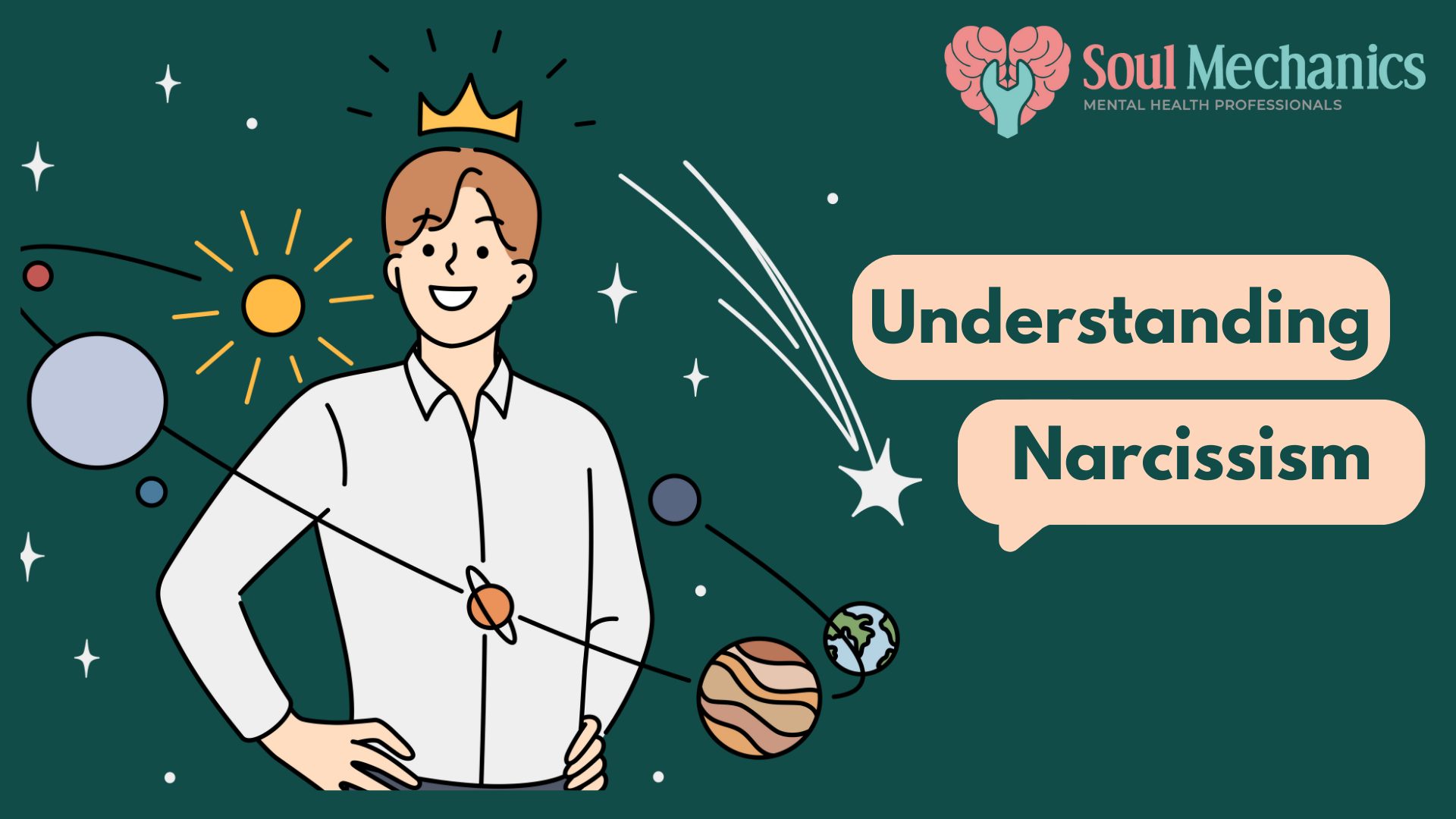Narcissism, What is it?
Narcissism, What is it?
Imagine someone you know who always thinks they are the best, talks about themselves all the time, and craves attention from everyone. They will always be about "me, me, me". Well, this is a glance into the world of narcissism. They would want to be in a constant spotlight of themselves. In this article, we are going to dive into what narcissism is, the forms of narcissism, how narcissism affects people and relationships, and what you can do when you encounter narcissistic traits.

What is narcissism?
Narcissism becomes a term that frequently appears in your social media scrolling. It is also a term that is often thrown around in conversations, but what does it mean? Narcissism refers to an excessive self-love and an inflated sense of self-importance. In simpler terms, it is when someone is overly obsessed with themselves. However, does that mean loving yourself is a form of narcissism as well? Here's the catch: self-love is about acknowledging one's flaws and strengths and loving oneself for self-growth. Meanwhile, narcissists often believe they are better than everyone else and want others to think the same way about them. Individuals with narcissistic traits will constantly seek admiration and can be self-centred (i.e., focus a lot on themselves and don't always consider other people's feelings). They believe they are unique and deserving of admiration from others.
Narcissistic Personality Disorder vs Narcissism
Is having narcissistic traits the same as having narcissistic personality disorder (NPD)? Interestingly, the answer to this million-dollar question is no. Having these characteristics does not necessarily mean that the individuals have NPD. Diagnosing individuals with NPD requires their narcissistic traits to cause significant impairment or distress in their daily functioning. Often, individuals with NPD may not realise that they are the cause of the problem. In contrast, individuals who have narcissistic traits will occasionally exhibit the traits without causing significant impairment in their functioning. They are likely to be aware of recognising narcissistic traits as having negative outcomes, and they are more likely to change their behaviours.

Different Forms of Narcissism
Narcissism isn't a one-size-fits-all concept. The most common type of narcissism is grandiose narcissism (also known as overt narcissism). Individuals with grandiose narcissism often have an inflated sense of self-importance. They believe they are better than others, constantly crave attention, and demand special treatment. Moreover, they may exaggerate their achievements and expect constant admiration. They also tend to impress other people through displays of status, beauty, wealth or intelligence.
The second type of narcissism is vulnerable narcissism (also known as covert narcissism). In contrast to grandiose narcissists, vulnerable narcissists may appear shy or sensitive, but they often have deep insecurities. They struggle with self-doubt and are hypersensitive towards criticism. They may avoid taking risks to protect their fragile self-esteem. Individuals with vulnerable narcissism will portray themselves as victims by exaggerating their hardships to gain sympathy, help or support from others. They may use emotional struggles, blaming, or shaming to manipulate others to get what they want.
The third form of narcissism is communal narcissism. Individuals with communal narcissism often illustrate an image of someone who is caring and self-sacrificing. On the surface, they come across as selfless and empathetic individuals who are often believed to be the most charitable people or best listeners. However, they usually expect gratitude and praise for their altruistic behaviours. They view themselves as the ultimate caregivers but may be quick to remind others of their sacrifices.
The last form of narcissism is malignant narcissism. This form of narcissism is often the most extreme or harmful form of narcissism. Individuals with malignant narcissism not only exhibit egocentric and self-important narcissistic behaviours, but they also display mean and detrimental behaviours (e.g., aggression, cruelty) towards others. Imagine someone who is not only self-centred but is also manipulative, cruel, and even enjoys causing pain to others (i.e., sadistic).
How It Affects People and Relationships?
Narcissism can have a distressing impact on individuals and their relationships. First of all, narcissistic traits can reduce one's capacity for empathy. Someone with narcissistic traits often prioritises their own needs and desires over those of others. Hence, this makes it challenging for them to understand and relate to the feelings and experiences of people around them. As a result, this lack of empathy can lead to emotional distance and conflicts.
Individuals with narcissistic traits may use manipulation and control to maintain their sense of superiority. They will attempt to control others by engaging in gaslighting behaviour (i.e., a tactic to make others doubt their perceptions) and guilt-tripping. This may cause emotional damage to those close to them.
People with narcissism struggle to form deep, authentic connections with others. Their relationships may be characterised by superficial interactions (shallow relationships), as they are primarily concerned with their needs and validation, disregarding others' needs. This can leave their friends, family or partners feeling unfulfilled and unimportant.
Individuals with narcissistic traits can be charming and engaging when they want something or need validation. They will bombard their friends or partners with affection, gifts and attention at times to create a cycle of intermittent positive reinforcement (i.e., delivery of reward at unpredictable intervals). In relationships, narcissists will often use this cycle of intermittent positive reinforcement to control their partners in the relationship, in which their partners will feel emotionally taxed and confused.

Dealing with Narcissism
If you encounter (suspected) narcissistic individuals in your life, don't worry. There are some strategies to navigate these relationships and protect your well-being. It is essential to establish and maintain healthy and firm boundaries to protect yourself from manipulation and emotional harm by individuals with narcissistic traits. Furthermore, it is important to clarify what behaviours are acceptable and unacceptable in your relationship/friendship with them.
It is essential to prioritise your well-being. Practising self-care and mindful activities can boost your self-esteem and emotional resilience. This can eventually help you to deal with the challenges that arise from a relationship with a narcissist.
A sound support system from friends, family and even your therapist plays a role in dealing with narcissism. Your support system can help you process your experiences and provide a safe space for your feelings.
Communication is the key! Whenever necessary, it is crucial to engage in calm and assertive communication with narcissistic individuals. Communicate clearly about your needs and concerns to them, but at the same time, be prepared for resistance or defensiveness from them.
Conclusion
Simply put, narcissism is an excessive self-love and an inflated sense of self-importance. Narcissism often manifests in different forms, and it can affect surrounding people and their relationships in various ways. This article allows you to recognise narcissistic behaviours to help you navigate these relationships and protect your emotional well-being. You can set boundaries, practice mindfulness and self-care, have a good support system and have assertive communication to deal with narcissistic individuals. While it is important to understand narcissism, it is also important to prioritise your own mental and emotional health when dealing with individuals with narcissistic traits.
If you enjoyed reading this, why not broaden the horizon of knowledge by learning about "Disenfranchised Grief"?
You can read the blog here.
For more content related to mental health do follow us on our official Instagram.

